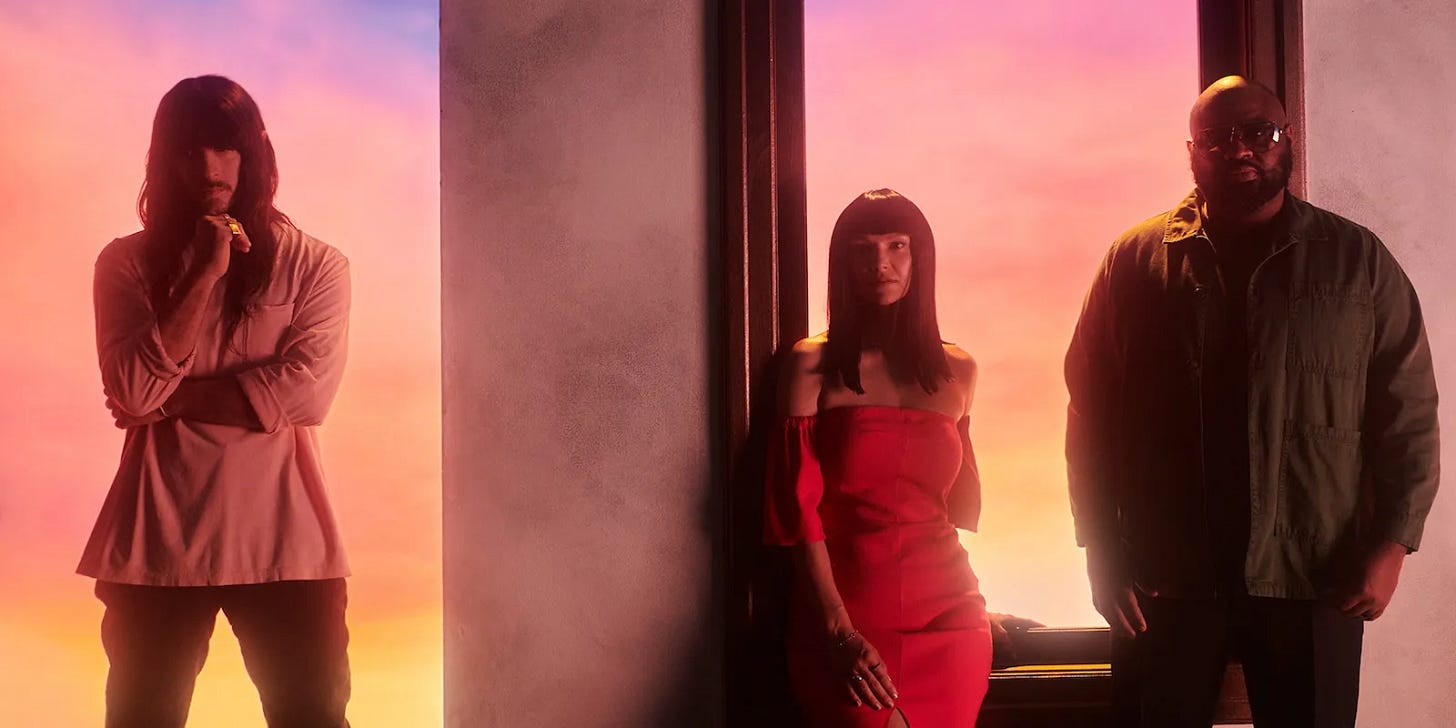Review | “A La Sala” by Khruangbin
Yet another masterpiece by the wizards of intercontinental eclecticism
As the title directs, “A La Sala”, is a (mostly) instrumental record orientated towards the calmer and sparse aesthetics of chamber music, proposing a more intimate listening affair as opposed to the danceable and funky output the legendary Khruangbin trio is better known for with their previous releases, including their particularly strong live performances all over the world.
According to bassist (and occasional Moog siren) Laura Lee Ochoa, “‘...there was a desire to get back to square-one between the three of us, to where we came from–in sonics and feeling. Let’s get back there.”
On "A La Sala," Khruangbin redirect their exploration inward, eschewing the clamor of external expectations, charting a personal trajectory homeward, prolonging their enigmatic aura and inherent sanctity.
Self-produced, with sole technical help by the group's longtime engineer, Steve Christensen, it serves as a portal into the wellsprings that propel Khruangbin's vision forward, a re-invention of potential futures co-existing with the past and present on the same timeline of irresistibly charming eclecticism.
In this manner, "A La Sala" may indeed represent Khruangbin's purest essence.
Being a record that confirms the group's signature blend of uchronic contexts and deterritorialized music(s), their fourth, just-released LP offers yet another feast of maximalist plunderphonics via the meticulous evocations of exquisitely recherché archival sounds, each reference a joy to the ears, all sourced globally but not just in the geographic sense, but articulating a manifesto about a universal understanding of music as shared consciousness, crossing boundaries of time and space to appeal to a sophisticated, considered, sensual ontology that belongs to no particular topology, taxonomic denomination or audiophile genre.
Underscoring their signature atmospherics are, as always, the metronomic percussion courtesy of drummer Donald “DJ” Johnson, Jr., the undulating curlicues of bassist Laura Lee Ochoa, and the twangy, moody, and unfailingly melodic guitar solos of guitarist Mark “Marko” Speer, who says: “I recall something I read long ago, attributed to Miles Davis. He said, 'When they play fast, you play slow. When they play slow, you play fast.' And that's precisely how I've approached music: Resist following trends. If the trend veers one way, veer the other."
"A La Sala" ("To the Room" in Spanish), in terms of rhythmic exercise is a return to origins to propel forward, all on idiosyncratic terms, downsizing the Khruangbin sound to amplify its essence, a creative tactic poised for further evolution.
It's a record that assumes the dual role of milestone and pivot, solidifying Khruangbin's position as a commercially and critically acclaimed ensemble that remains guided by the limitless potentialities of creativity.
Whereas prior albums hinted at an expansive multicultural ethos seeking edges at the most advanced frontiers of world music, such explorations now resonate as familiar intimacies instead of curated exotica.
On the playlist of this intercontinental soirée, many favorites have become comforting in the most soothing sense: what was once perceived as sonic summonings—spaghetti-western film scores, found sounds, moments of dance beats more reminiscent of living room gatherings than rooftop discos—are now ingrained signatures.
Yet, there's a novelty to the instrumental interplay on "A La Sala" that transcends mere experimentation; it's less about venturing outward than delving deeper inward.
This depth isn't rooted in erudite, self-satisfied introspection but rather in a profound reverence for the external marvels of the world.
From their inception, Khruangbin's trajectory has been resolutely unique: a sonic and visual manifestation with few parallels, unbound by pop conventions, guided solely by internal inspirations and a multiplicity of visions. It's a philosophy rooted in self-discovery, interconnectedness with the world, and the cultivation of personal experiences.
The foundation of the album's twelve tracks lies in fragments culled from the group's creative past—ideas initially captured in impromptu recordings, whether during sound checks, on extended journeys, or as fleeting epiphanies. These fragments were then meticulously assembled in the studio: once again, a familial synergy comes into play, through a process of layering, refining, and reimagining, new sonic landscapes emerge, inspiring new directions and musical dialogues.
“All the little moments you capture. You don't see how impactful they are until you hear what eventually comes of them. A lot of those scraps end up being the thing — and you don't realize it until it's ‘The Thing.’” says drummer Donald “DJ” Johnson.
The album's denouement, "Les Petits Gris," offers a poignant conclusion—a moment of quiet introspection, a prelude to what lies ahead. With its plaintive piano chords and understated bassline, Marko's emotive guitar work evokes the haunting melody of a music box, epitomizing Khruangbin's ethos—an amalgamation of introspection, cultural synthesis, and boundless invention.
It's a testament to their unwavering commitment while forging their own musical path, unencumbered by trends or expectations.
Through meticulous craftsmanship and a deep reverence for the world around them, Khruangbin invite listeners on a transcendent journey—one that celebrates the interconnectedness of sound, space, and time.
In conclusion, "A La Sala" stands as a testament to Khruangbin's evolution—a sonic odyssey that simultaneously reflects their past, present, and future. It's a profound exploration of musical identity, cultural hybridity, and the transformative power of creativity.
As the group continues to chart new sonic territories and redefine the boundaries of genre, their latest record serves as a poignant reminder of the beauty that emerges when artists dare to defy convention and embrace the unknown.
Text written by Panagiotis Chatzistefanou, Berlin, April 2024




